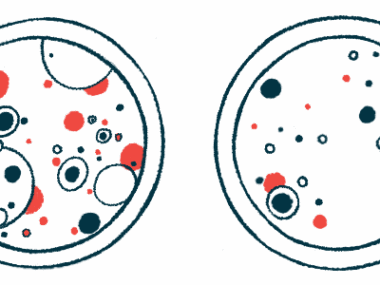Umbilical Cord Stem Cells Eased RDEB Symptoms
Written by |

When injected into the bloodstream, mesenchymal stem cells (MSCs) — cells that can grow into different cell types and have potent regeneration properties — can temporarily reduce pain, skin itching and blistering, and improve the quality of life of children and adults with recessive dystrophic epidermolysis bullosa (RDEB).
Despite those promising findings from a Phase 1/2a clinical trial, investigators in South Korea said that larger studies will be needed to define the optimal doses and frequency at which these cells should be given to patients, as well as to assess the long-term effects of this form of therapy.
Trial findings were reported in the study, “Intravenous allogeneic umbilical cord blood–derived mesenchymal stem cell therapy in recessive dystrophic epidermolysis bullosa patients,” published in the journal JCI Insight.
RDEB is a form of epidermolysis bullosa (EB), a genetic skin disorder in which patients’ skin blisters and tears easily, causing painful wounds and scarring.
In recent years, MSCs started being regarded as promising cell therapy alternatives in RDEB, due to their ability to migrate to damaged tissues, promote tissue regeneration, and reduce scarring (fibrosis). These stem cells can be isolated from different sources, including bone marrow or the umbilical cord of newborns.
Previous clinical trials assessing the therapeutic potential of MSCs isolated from the bone marrow of healthy donors showed treatment was safe and led to several benefits that lasted months in both children and adults with RDEB.
“However, umbilical cord blood (UCB) has become an attractive source of stem cells, because of its noninvasive collection procedure and rapid availability from cord blood banking,” the researchers wrote.
Some studies also have indicated that MSCs derived from umbilical cord blood can grow at faster rates and are less likely to cause adverse immune reactions when given to patients, compared with those isolated from bone marrow.
Investigators in South Korea now have reported the findings of the first clinical trial (NCT04520022) that assessed the safety and preliminary effectiveness of MSCs derived from umbilical cord blood in children and adults with RDEB.
During the Phase 1/2a trial, four adults (three women and one man, ages 21 to 60) and two girls, ages 8 and 13, received three injections of MSCs (1×106 to 3×106 cells/kg) directly into the bloodstream, in two-week intervals. After completing treatment, participants were followed for eight to 24 months.
In addition to assessing safety, which was the study’s main goal, the investigators evaluated several clinical parameters, including disease severity, pain, skin itching and blistering, and patients’ overall quality of life. They also evaluated the effects of treatment on immune cell infiltration in the skin, as well as on the levels of several inflammatory markers.
Safety analyses revealed intravenous MSC infusions were generally safe and well-tolerated and did not cause any serious side effects. Wound infection was the most common side effect reported. However, all cases of wound infections were thought to be a result of RDEB itself.
Acute gastritis (sudden inflammation and swelling of the stomach lining) was the only side effect that was found to be possibly related to treatment.
Preliminary efficacy analyses also revealed treatment was associated with a series of positive effects, including a decrease in disease severity, pain, skin itching and blistering, and an overall improvement in patients’ quality of life.
Maximal effects in all these clinical parameters were observed 56–112 days (from less than two months to almost four months) after patients received their last cell infusion. After that, these positive effects started to gradually subside through day 168.
Treatment also lowered immune cell infiltration into the patients’ skin. However, it failed to lower the levels of several inflammatory markers, including C‐reactive protein, interleukin-6, and interleukin-1 beta.
In one patient, MSC infusions also increased the production of type 7 collagen, a protein that is essential to maintain a healthy skin and is missing in people with RDEB, by day 56.
“To the best of our knowledge, this is the first clinical trial of systemic administration of [umbilical cord blood-derived MSCs] in patients with RDEB, demonstrating safety and transient clinical benefits,” the researchers wrote.
“In the future, larger clinical trials are needed to investigate the optimal dosage, number of injections, differential efficacy of different tissue-derived MSCs, and the long-term safety of allogeneic [donor-derived] MSC therapy for RDEB,” they wrote.





